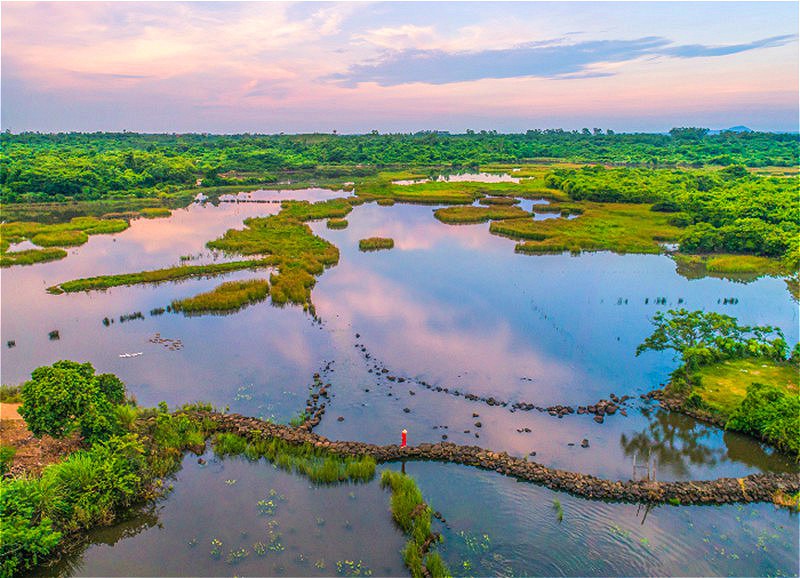Heihe: a colorful jewel on China-Russia border
Heihe is a small, pleasant city with a celebrated fusion of cultures. Over a century ago, a massive influx of traders from countries including the US, France and Germany did business here, which was thus extolled as a "commercial port of all nations." Covering over 26,000 square miles, the city is home to over 30 Chinese ethnic groups, each having its own unique cultures and customs.
One of the jewels in China's travel crown, nearly half of the land area was covered by lush forests, making it a natural oxygen bar; one of the world's three major cold mineral springs originates from here. Idyllic sceneries and diversified cultures all add up to a unique experience for travelers who want a nice getaway.
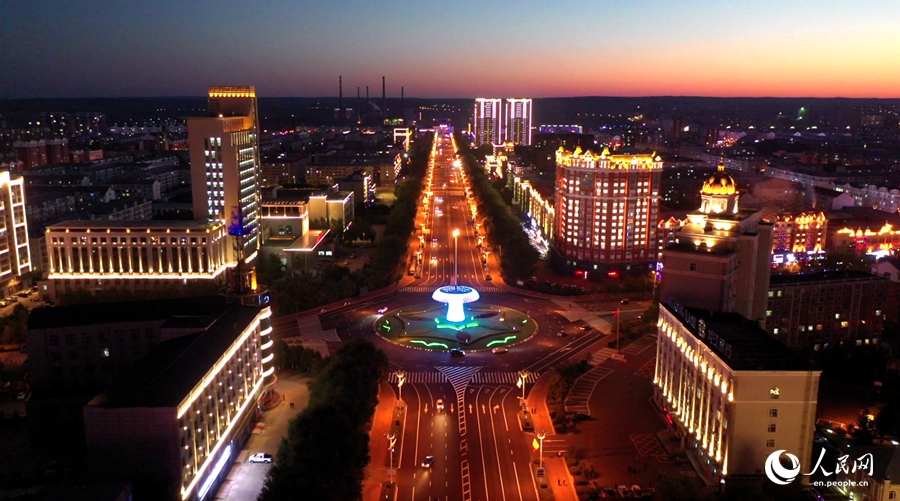
Night view of Heihe, located in northeast China’s Heilongjiang province bordering Russia’s Blagoveshchensk. (Photo/People’s Daily Online)
Heihe, located in northeast China's Heilongjiang province bordering Russia's Blagoveshchensk, gleams like an emerald drop in the necklace of the Heilongjiang River that straddles the two countries. The city is not only a captivating tourist destination, but a vivid epitome of China's reform and opening up as a cross-border commercial hub.
A land of multiple cultures

Photo shows the China-Russia Nationalities Folk Customs Park in Heihe. (Photo/People’s Daily Online)
In Heihe, Russian style is ubiquitous. Walking along the riverside in the evening, one can see the city of Blagoveshchensk glistening across the river. Russian-style buildings can be seen everywhere, with many shop signs spelled in both Chinese and Russian.
In local markets, fur products, amethyst jewelry, Russian dolls and other typical Russian specialties abound; vibrant mounds of Russian snacks such as chocolate and candy are heaped with prices so attractive that one does not need to haggle.

Russian cuisine has also become a unique symbol of Heihe. (Photo/People’s Daily Online)
Russian cuisine has also become a unique symbol of Heihe. Borscht (red beetroot soup), caviar, blini (a Russian style pancake), beef stroganoff, vodka…local people can relish the tantalizingly tasty Russian food here without going abroad.
In addition to cultural charms, the natural landscape is also spellbinding for tourists. There are five lakes in the city that were interconnected by a volcanic eruption, which is named "Wudalianchi," meaning "five connected lakes" in Chinese. The gigantic volcanic cluster mainly consists of 14 young and old volcanoes that erupted over various periods of time, with the last eruption of these volcanoes occurring around 300 years ago.

With its wealth of geological features, Wudalianchi is celebrated as a "Natural Volcano Museum" and a "Living Textbook on Volcanoes." (Photo/Wudalianchi Broadcast and TV Station)
Centuries later, the natural marvel has stood through the vicissitudes of time, a tangible reminder of the power of the Earth's forces. Boasting a well-preserved range of volcanic landforms, Wudalianchi is celebrated by geologists as a "Natural Volcano Museum" which possesses every volcanic landscape that one expets to find. In 2004, it was formally classified as a UNESCO Global Geopark.
In recent years, the tourism industry in Heihe achieved rapid development. For the past five years, the number of tourists travelling to Heihe reached over 13 million, with the tourism revenue surpassing 1.7 billion dollars.
On this picturesque land with distinct Russian flavor, ethnic minority cultures have been passed down from generation to generation. Tao Dandan is among the nearly 70,000 members of ethnic minorities in the city. Born into a Manchu family, she is an inheritor of the intangible cultural heritage of birch bark culture.
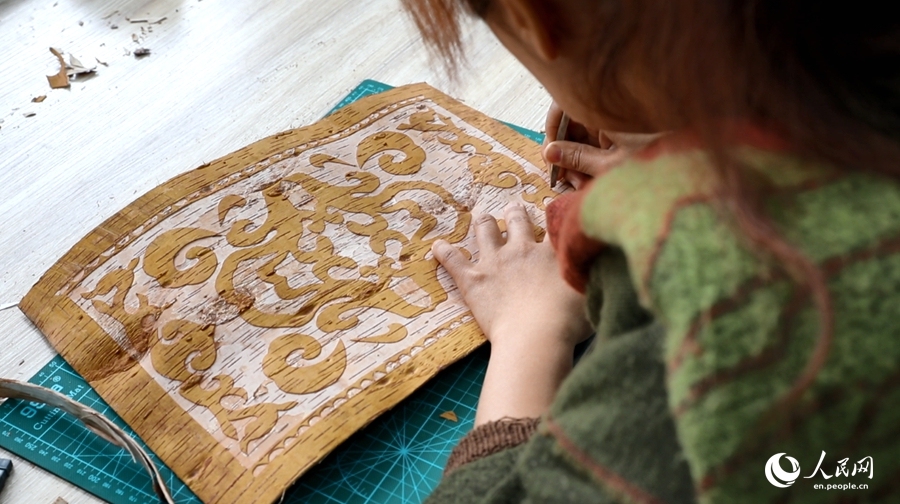
Tao Dandan is an inheritor of the intangible cultural heritage of birch bark culture. (Photo/People’s Daily Online)
Tao became familiar with birch bark at a very young age, and set up her own workshop when she was 23 years old. At present, her workshop is housed in a modern shopping center in Heihe. The surprising collection of quality paintings and crafts made of birch bark placed throughout the property speaks volumes of her devotion to the art.
Since her career started, Tao has endured a long, tough journey in promoting the birch bark culture, but the situation started to change a decade ago as China attached greater importance to the cultural industry. The folk culture, especially the intangible cultural heritage, has witnessed a leapfrog in development.
Due to the special talent introduction policy by local authorities, Tao has also become a professor at Heihe College, which has set up a course of local folk culture, inviting masters like Tao to teach the traditional ethnic cultures to students.
"[Inheriting the birch bark culture] is a difficult journey, and it cannot be accomplished by one person, or one generation," Tao shared, adding that she is prepared to continue this journey for the rest of her life.
Cross-border commerce hub
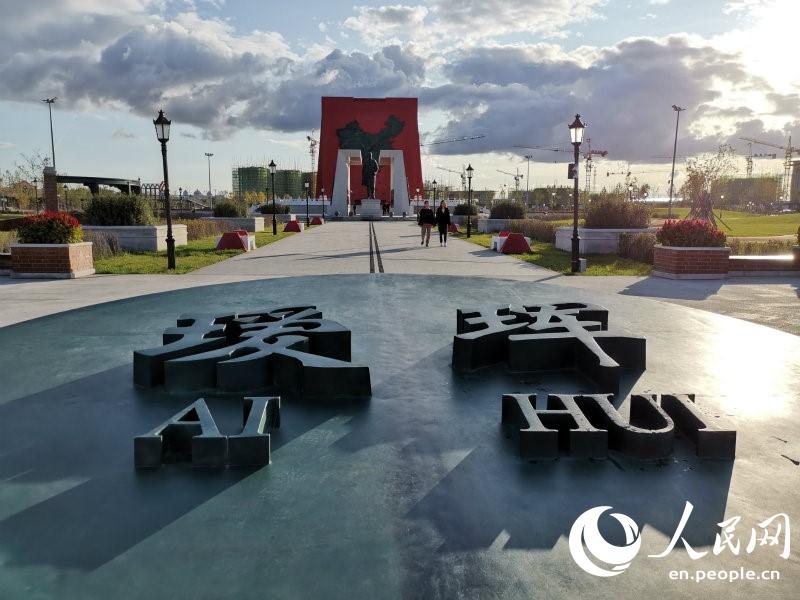
The Heihe-Tengchong Line is an imaginary line drawn by Chinese geographer Hu Huanyong in 1935, which divides the population density of China. It stretches from the city of Heihe in northeast China’s Heilongjiang province to Tengchong County in southwest China’s Yunnan province. (People’s Daily Online/Yang Qian)
Heihe was born on the border and thrives on trade. In 1992, Heihe was included among the first batch of border cities in China's reform and opening up. In 2019, after decades of development Heihe has become the northernmost free trade zone in China, now finding new paths of growth by capitalizing on its geographic advantages, lifting the cross-border trade ties to a higher level.
As Heihe and Blagoveshchensk face each other across the Heilongjiang River, imported goods from the other side of the river, such as tiramisu cake, chocolate and other Russian products can be delivered in the same-day to Heihe, said Zhong Huanyu, director of the Heihe Cross-border E-commerce Industrial Park.
Established in 2016, Epinduo is now China's leading platform for the sale of Russian goods. "At present, there are around 7,000 types of products available at our stores. Roughly all kinds of Russian food products can be purchased here," said Epinduo's CEO Jing Quan, adding "the weakening ruble and a pursuit of better living standards have stimulated people's demand for Russian goods".
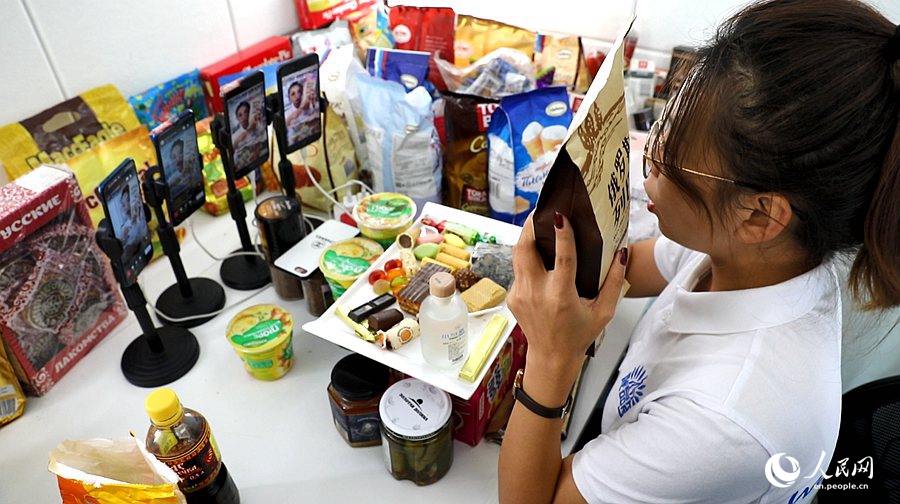
Epinduo has jumped on the bandwagon of participating in live commerce, a fusion of shopping and live streaming. (Photo/People’s Daily Online)
Along with offline stores, the company operates various online shopping platforms such as JD.com, Taobao and Pinduoduo, also jumping on the bandwagon of participating in live commerce, a fusion of shopping and live streaming.
According to Jing, e-commerce enterprises in Heihe now use big data systems to predict sales in different regions throughout China, storing goods in multiple warehouses in advance in order to shorten logistic times and reduce costs.
"It used to take customers in Shanghai four or five days to receive the goods. Now it only takes two days and the price is nearly 20 percent lower," Jing said, noting that in the first eight months of this year, Epinduo's online sales increased by 2.6 times year-on-year.
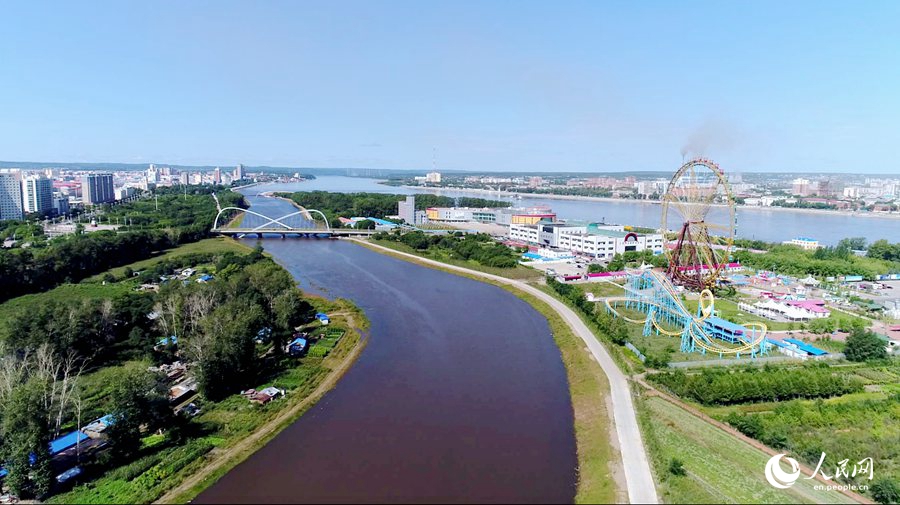
Heihe, a border city in northeast China’s Heilongjiang province, sits along China’s 4,200 km border with Russia. (Photo/People’s Daily Online)
Heihe is also home to China's largest China-to-Russia electromechanical devices seller, Liyuanda Group. During the pandemic, the e-commerce platform has helped the company withstand the COVID-19 headwinds. "Amid COVID-19, our inventory in the Russian market has basically been cleared through online sales," said Song Zenan, general manager of Liyuanda Group, adding that nearly $440,000 of small-sized devices and accessories have been sold online during the pandemic.
Since the establishment of the FTZ, cross-border e-commerce in Heihe has witnessed fast development. During the first half of this year, the trade volume of companies in the Heihe Cross-border E-commerce Industrial Park reached nearly 100 million US dollars, among which the online retail sales increased by 11.2 percent year-on-year. At present, Heihe FTZ is home to 797 registered enterprises, with fixed asset investment increasing by 18.5 percent year-on-year in the first half of this year.
The continuous development of cross-border trade boosted the various exchanges between China and Russia. During the COVID-19 pandemic, a temporary passenger corridor was set up between the twin cities of Heihe and Blagoveshchensk, providing assistance for the evacuation of stranded people from both sides free of charge; a "green channel" for medical supplies has also opened to alleviate the shortage of medical resources.
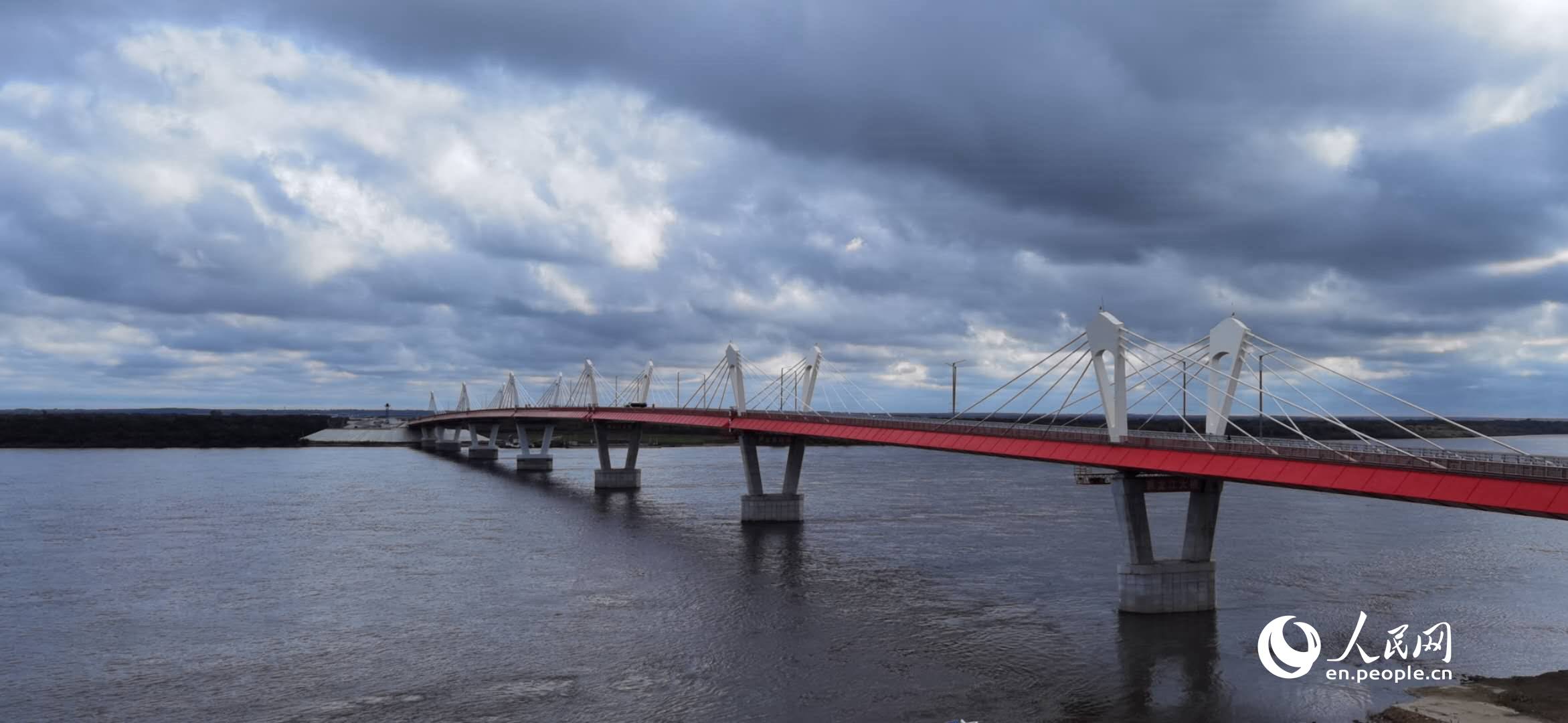
Photo taken on Sept. 23, 2020 shows the first highway bridge connecting Heihe, Heilongjiang province, with the Russian city of Blagoveshchensk across the Heilongjiang River. (People’s Daily Online/Xian Jiangnan)
Heihe plans to collaborate with Russia in the research and development of traditional Chinese medicine (TCM). According to Zhang Haipeng, Deputy Director of China's Pilot Free Trade Zone Heihe Area, Heihe is preparing to build an overseas TCM center in Blagoveshchensk, introducing the TCM rehabilitation technology to Russia and bringing more TCM products to Russians.
"Heihe is also cooperating with Japan and South Korea on green food, TCM, tourism and health care, and with Kazakhstan, Poland, Serbia and other countries on the R&D of food and agriculture. Many Chinese enterprises are coming to us to establish cross-border e-commerce cooperation with Western countries," Zhang said.
In 2019, the first cross-border highway bridge was built along the China-Russia border, and the China–Russia East-Route Natural Gas Pipeline was officially put into operation; in 2020, comprehensive pilot zone (Heihe) for cross-border e-commerce was approved. With the development of the Belt and Road Initiative, the border city forges ahead, opening wider to the outside world.
Photos
Related Stories
- FMs reaffirm role of China-Russia treaty in stronger ties
- China, Russia eye fixing ‘global disorder’ amid US withdrawal
- Sino-Russian relations as solid as rock: FM spokesperson
- China, Russia bilateral cooperation continues to burgeon
- Xi, Putin witness launch of joint nuclear energy project, high-quality China-Russia cooperation boosted
Copyright © 2021 People's Daily Online. All Rights Reserved.







